unit1grammar
牛津译林七年级英语上册Unit1-Grammar-课件(共28张PPT)

2. They are classmates. _A__re_ they classmates? No, they a_r_e_n_’_t.
3. Eddie is Hobo’s master. __I_s__ Eddie Hobo’s master? No, it _is_n_’_t.
Activity 8: Make a conclusion
句型转换
1. His cousin is good at swimming.(改为否定句)
_H__i_s_c_o_u_s_i_n__is_n__’t__g_o_o_d__a_t_s_w__im__m__i_n_g_._
2. Those boys are from Beijing.(改为一般疑问句, 并做否定回答) —A—re—th—os—e b—oy—s f—ro—m—Be—ij—ing—? —No—, t—he—y a—re—n’—t.
Are they classmates?
肯定:Yes, they are. 否定:No, they aren’t.
在一般疑问句的肯定回 答中不能用缩写形式
变疑问,be提前,句末问号莫丢弃。
Fill in the blanks
1. It is a reading room. __Is__ it a reading room? Yes, it __is__.
am
牛津译林英语 九年级上册 Unit1 Grammar (共39张PPT)
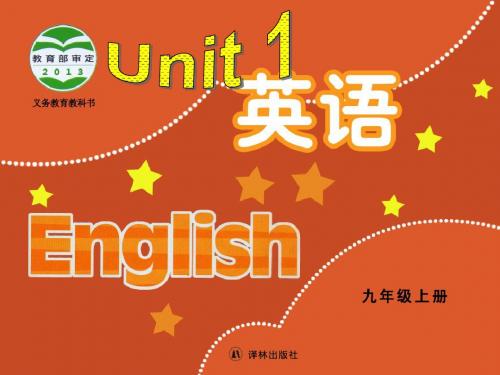
1. I dislike not only coffee but also Cola.
2. I like neither maths nor English. 3. You either take the lead or fall
behind. 4. Both Sandy and Millie have been to
neither…nor… “既不……也不……”, 具有否定含义。当neither…or…连接两 个主语时,其谓语动词应与最近的一个 主语在人称和数上保持一致。
e.g. Billy has not finished his homework. Daniel has not finished his homework. Neither Billy nor Daniel has finished his homework.
Amy’s family and classmates Amy is writing about what her family does at the weekend. Help her complete the sentences with the correct conjunctions.
1. __N_e_i_th__e_r_ my dad __n_o_r__ my mum
We use conjunctions like and, but, or and so to join ideas together.
人教版高中英语必修一unit1grammar

Whenyouchangeasentencefromdirects peechtoindirectspeech,yousometimes needtochangetheverbtense.Youmayal soneedtochangepronouns,timeinorder
tokeepthesamemeaning.
“Idon’tlikecomputers,”Sarahsaidtoherfriends.
Sarahsaidtoherfriends that Idon’tlike
computers. Sarah said
she
didn’t
Sarahsaidtoherfriendsthatshedidn’tlikecomput ers.
he
harvested Theyaskedhimwhenheharvestedthewheat.
选择疑问句
•用whether…or…表达,而不用if…or…,也 不用either…or… • Heasked,“DoyouspeakEnglishorFrench?”
• HeaskedmewhetherIspokeEnglishorFrenc h.
3.Tomsaid“Iwillseeyounextweek.” Tomsaidthathewouldseemethenextweek.
4.“Whywereyoulateagain?”Theteachersaidtome. TheteacheraskedmewhyIwaslateagain.
5.“Idon’tlikeswimming,”saidSarah. Sarahsaidshedidn’tlikeswimming.
一般疑问句
•间接引语用连词whether或if引导,原主句中 谓语动词said要改为asked(me/him/us等), 语序是陈述句的语序
高一英语必修一Unit1Grammar语法直接引语间接引语
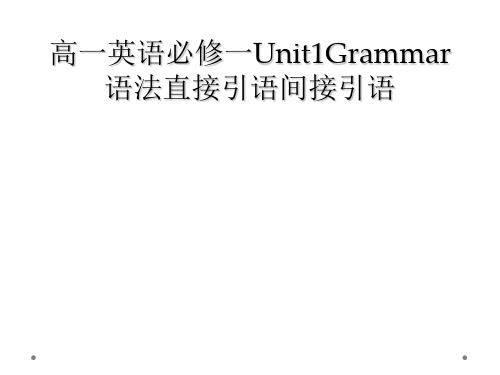
仍用一般现在时。例如: Teacher said to us:" The moon moves round
the earth." Teacher told us the moon moves round the earth. The teacher said to us : “Light travels faster
宾语从句
判断以下哪些句子属于间接引语
She said that she didn’t want to be a teacher. 间接 She said, “I don’t want to be a teacher〞.直接 He said, “ I like playing football〞. 直接 He said that he liked playing football. 间接
3. Mr Black said, “I have walked a long way this week.〞 Mr Black said that __ a long way __. A. I had walked…last week B. he had walked…that week C. I walked…last week D. he has walked…this week
〞 • 间接引语 Mum told me that I could clean my bedroom the next day . • Mr. Smith said,“He is a good worker. ’’ • Mr. Smith said that he was a good worker.
3.人称的变化
• 直接引语里的第一人称和第二人称,变间接引语时,人称要做相 应调整。例如:
必修一 Unit 1 Grammar-句子成分及基本句子结构

➢ e.g.
I will watch the movie.
He borrowed my key.
Time flies.
He can play basketball.
She quickly filled in the form.
句子成分
Unit 1 A new start Using language
句子成分
Unit 1 A new start Using language
表语或主语补足语 Subject complement
➢ 表语或主语补足语是接在联系动词(linking verb)之后的,用于补充说明主语所 处的状态的成分,一般由名词或形容词充当,整个句子构成所谓的“主系表”结构。 联系动词除了可以用be动词(am, is, are)构成之外,还可以用感官动词(smell, feel, taste…)充当。
c
4. I breathed deeply.
f
5. I looked at them in panic. g
6. I was embarrassed
a
7. His words made me a lot more relaxed! b
a He was friendly. b The exam made me quite nervous. c I passed him a book. d She agreed. e He wrote a long letter. f He talked loudly. g She looked after her sister patiently.
小试牛刀
造句练习
Unit 1 A new start Using language
Unit1Grammar课件牛津译林版英语九年级上册
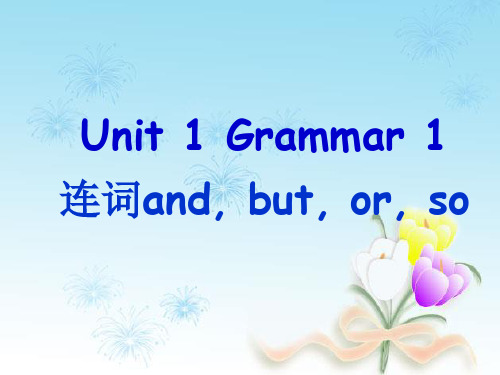
get any milk.
*16. Excuse me, _b_u_t__ could you show me
how to use the machine?
both either neither none all any的用法
I am active and energetic, and I love working with people.
Let’s join the two sentences together.
1. He doesn’t like to talk much. 2. His work shouts!
(but) join two different ideas
◆ We use ‘so’ to express the result of something. Attention: If the two subjects and verbs are the same, we do not need to repeat the first ones when we join ideas together with and, but and or .
两者
三者或三者以上
任何一个
either
any
都
both
all
任何一个都不
neither
none
作不定代词 either/both/neither/any/ all/ of sth. (sb.) 名词复数
both of us neither of the twins either of the two answers
8. — Have you seen Tom and Mary? —No, I haven seen _n_e_it_h_e_r__ of them.
译林版2020 必修一 Unit 1 Grammar句子成分和结构,共13页
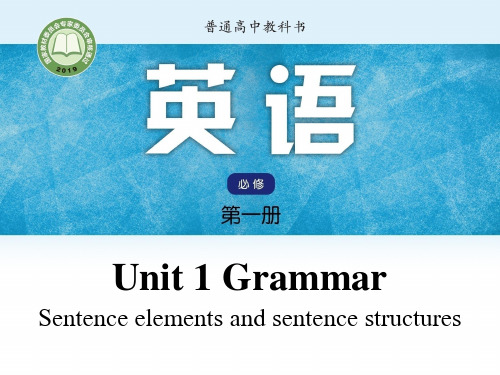
主
宾
10.He gave his son some advice on reading.
主
间宾
直宾
Exploring the rules
Subject
I
Subject
These habits
Subject
You
Subject
Setting goals
Subject
Setting goals
Verb
makes
you
more confident.
Applying the rules
Mark the different elements of each sentence with different symbols.
Applying the Rules
1. You will find (senior high) school different from (junior high) school. 2. (Your) schoolwork will be more challenging. 3. We will give you (more) independence. 4. You should listen [more carefully]. 5. You can join a club. 6. (Your) teachers will help you [in (many) ways]. 7. You will succeed.
宾语(object)
Underline the objects of the following sentences.
1. She covered her face with her hands. 2. We haven't seen her for a long time. 3. Do you mind opening the window? 4. Give me four please. 5. He wants to dream a nice dream. 6. We need to know what others are doing. 7. I lived in Japan in 1986.
译林版高一英语必修第一册(2019版)_Unit1_Grammar_同步练习
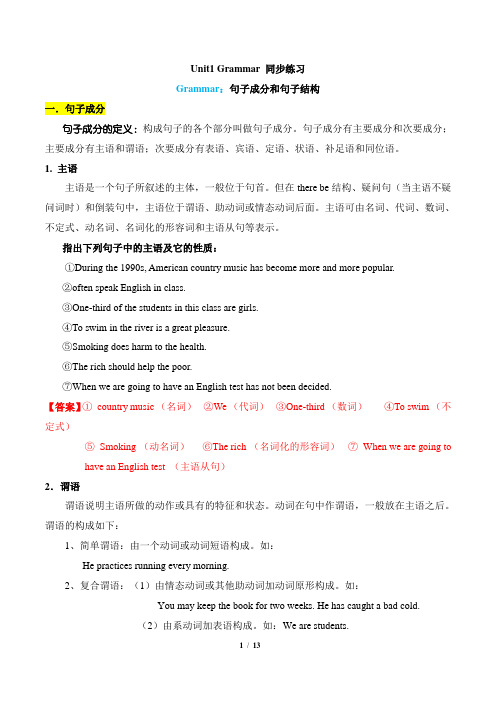
Unit1 Grammar 同步练习Grammar:句子成分和句子结构一.句子成分句子成分的定义:构成句子的各个部分叫做句子成分。
句子成分有主要成分和次要成分;主要成分有主语和谓语;次要成分有表语、宾语、定语、状语、补足语和同位语。
1. 主语主语是一个句子所叙述的主体,一般位于句首。
但在there be结构、疑问句(当主语不疑问词时)和倒装句中,主语位于谓语、助动词或情态动词后面。
主语可由名词、代词、数词、不定式、动名词、名词化的形容词和主语从句等表示。
指出下列句子中的主语及它的性质:①During the 1990s, American country music has become more and more popular.②often speak English in class.③One-third of the students in this class are girls.④To swim in the river is a great pleasure.⑤Smoking does harm to the health.⑥The rich should help the poor.⑦When we are going to have an English test has not been decided.【答案】①country music (名词)②We (代词)③One-third (数词)④To swim (不定式)⑤Smoking (动名词)⑥The rich (名词化的形容词)⑦When we are going tohave an English test (主语从句)2.谓语谓语说明主语所做的动作或具有的特征和状态。
动词在句中作谓语,一般放在主语之后。
谓语的构成如下:1、简单谓语:由一个动词或动词短语构成。
如:He practices running every morning.2、复合谓语:(1)由情态动词或其他助动词加动词原形构成。
Unit 1 Grammar
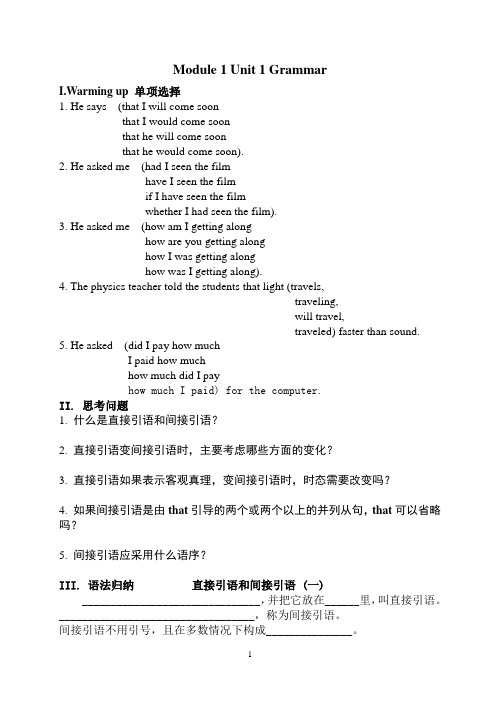
Module 1 Unit 1 GrammarI.Warming up 单项选择1. He says (that I will come soonthat I would come soonthat he will come soonthat he would come soon).2. He asked me (had I seen the filmhave I seen the filmif I have seen the filmwhether I had seen the film).3. He asked me (how am I getting alonghow are you getting alonghow I was getting alonghow was I getting along).4. The physics teacher told the students that light (travels,traveling,will travel,traveled) faster than sound.5. He asked (did I pay how muchI paid how muchhow much did I payhow much I paid) for the computer.II. 思考问题1. 什么是直接引语和间接引语?2. 直接引语变间接引语时,主要考虑哪些方面的变化?3. 直接引语如果表示客观真理,变间接引语时,时态需要改变吗?4. 如果间接引语是由that引导的两个或两个以上的并列从句,that可以省略吗?5. 间接引语应采用什么语序?III. 语法归纳直接引语和间接引语 (一)_______________________________,并把它放在______里,叫直接引语。
__________________________________,称为间接引语。
九年级上册英语Unit1 grammar知识讲解和练习-译林版(含答案)
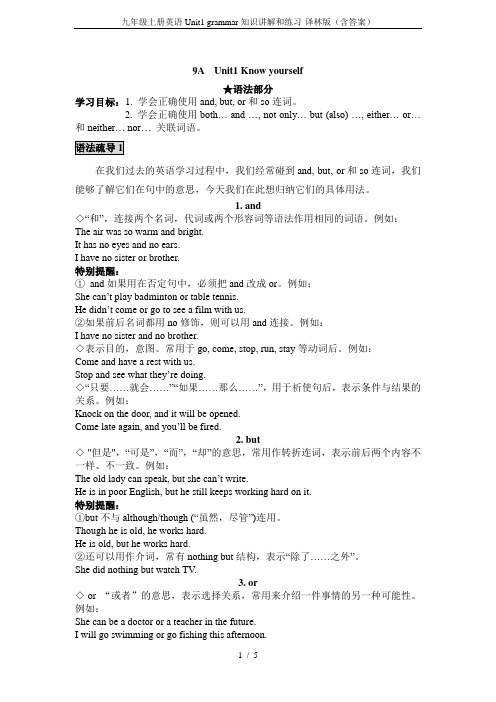
9A Unit1 Know yourself★语法部分学习目标:1. 学会正确使用and, but, or和so连词。
2. 学会正确使用both… and …, not only… but (also) …, either… or…和neither… nor… 关联词语。
在我们过去的英语学习过程中,我们经常碰到and, but, or和so连词,我们能够了解它们在句中的意思,今天我们在此想归纳它们的具体用法。
1. and◇“和”,连接两个名词,代词或两个形容词等语法作用相同的词语。
例如:The air was so warm and bright.It has no eyes and no ears.I have no sister or brother.特别提醒:①and如果用在否定句中,必须把and改成or。
例如:She can’t play badminton or table tennis.He didn’t come or go to see a film with us.②如果前后名词都用no修饰,则可以用and连接。
例如:I have no sister and no brother.◇表示目的,意图。
常用于go, come, stop, run, stay等动词后。
例如:Come and have a rest with us.Stop and see what they’re doing.◇“只要……就会……”“如果……那么……”,用于祈使句后,表示条件与结果的关系。
例如:Knock on the door, and it will be opened.Come l ate again, and you’ll be fired.2. but◇ "但是",“可是”,“而”,“却”的意思,常用作转折连词,表示前后两个内容不一样、不一致。
例如:The old lady can speak, but she can’t write.He is in poor English, but he still keeps working hard on it.特别提醒:①but不与although/though (“虽然,尽管”)连用。
Unit 1 Grammar 知识点讲解练习(解析版)
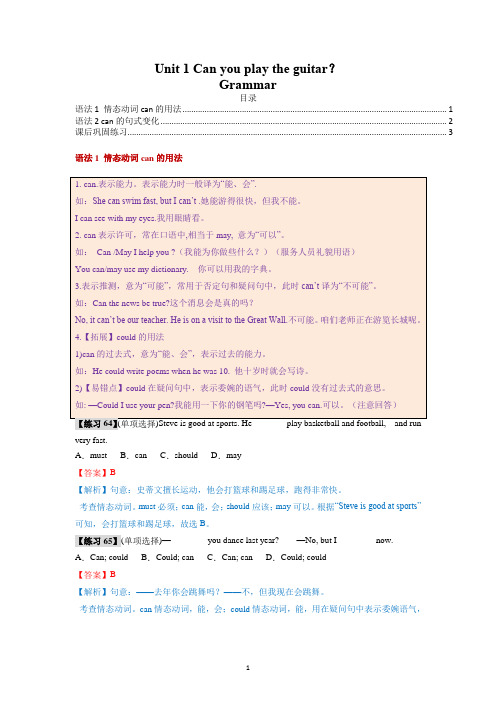
Unit 1 Can you play the guitar?Grammar目录语法1 情态动词can的用法 (1)语法2 can的句式变化 (2)课后巩固练习 (3)语法1 情态动词can的用法very fast.A.must B.can C.should D.may【答案】B【解析】句意:史蒂文擅长运动,他会打篮球和踢足球,跑得非常快。
考查情态动词。
must必须;can能,会;should应该;may可以。
根据“Steve is good at sports”可知,会打篮球和踢足球,故选B。
【练习65】(单项选择)—________ you dance last year? —No, but I ________ now.A.Can; could B.Could; can C.Can; can D.Could; could【答案】B【解析】句意:——去年你会跳舞吗?——不,但我现在会跳舞。
考查情态动词。
can情态动词,能,会;could情态动词,能,用在疑问句中表示委婉语气,也可表示过去的能力,第一空表示过去的能力用could,第二空是肯定句,有时间状语now 用can,故选B。
【练习66】(单项选择)Tom can’t play basketball on school days, but he ________ play it on weekends.A.must B.can C.have to D.should【答案】B【解析】句意:汤姆不能在上学的日子打篮球,但他可以在周末打。
考查情态动词。
must必须、一定;can可以、能够;have to不得不;should应该。
由转折词but可知,前后句之间表达的应是转折关系,前面说不能在上学的日子打篮球,则后面应该是说可以在周末打,因此can符合题意,故选B。
语法2 can的句式变化Bill ________ ________ the piano well.【答案】can play【解析】句意:比尔钢琴弹得很好。
高中英语 Unit1 Grammar 牛津译林版必修1
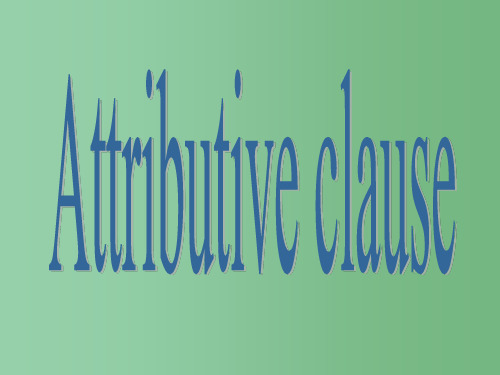
3. Some of the cities in China which he likes most are Beijing, Shanghai, Harbin and Nanjing.
什么是定语从句?
• 在英语中, 修饰或限制一个名词或代词的从句就叫 定语从句。
1. I loved the lessons that he gave in English
literature.
2.All my classmates were fond of the cake that I
made.
Subject
The trees are behind the office building. They have lost their leaves.
The trees which are behind the office building have lost their leaves.
Object
3. In the Art class that I took, I made a small
sculpture.
相关概念: • 先行词:定语从句所修饰的名词或代词。 • 关系词:连接定语从句和主句,并在定语从句中代替
先行词充当成分(主语、宾语、表语、定语以及状语) 的词。
Functions
In the attributive clauses the relative words usually function as the: subject, object, predicative, attribute, adverbial.
_Unit1 Grammar 知识点整理及练习牛津译林版英语八年级上册

8AU1Grammar-2形容词的比较级和最高级四、形容词最高级的用法1.基本用法:形容词的最高级用于三个或者三个以上的人或者事物进行比较。
它前面通常要有定冠词the,后面通常接“of……/in……”当比较的范围与主语是同一类人或物,或属于同一概念时,要用介词of引导的短语;当比较的范围与主语不是同一类人或物,强调在某一范围或场所内进行比较时,要用介词in引导的短语。
Measles is the most serious of the three illnesses.麻疹是这三种疾病中最严重的一种。
You are the best student in our school.你是我们学校最好的。
[巩固练习](1)我们三个人中Simon 最擅长讲笑话。
(2)这家店里最贵的电脑也是最好的。
(3)英语是重要的外语之一。
答案:(1)Simon is the best at telling funny jokes of us three.(2)The most expensive computer is also the best in this shop.(3)English is one of the most important foreign languages.[经典例题](1)—Which month has ___________ days, February, March or April?—February.A. the leastB. the mostC. the fewestD. the shortest(2)—Millie has__________tomatoes, but she has __________juice among the three of us.A. fewer; lessB.the most; the leastC. the most; the fewestD. fewer; more(3)What_________honest boy! And he is________best student of all.A. a ; aB. an ; /C. a ; theD. an ; the(4)This bag is not expensive. And the price of it is the ________ of the three.A. lowestB. cheapestC. highestD. most expensive(5)—Guess what! The university has accepted my application (申请)!—Wow! That’s________new I’ve heard this year, Boris! Let’s celebrate.A. a worseB. the worstC. a betterD. the best(6)—Which of those radios sounds________?—The smallest one .A. goodB. wellC. betterD. best(7)Which city is______, Beijing, Shanghai or Fuzhou?A. beautifulB. more beautifulC. much more beautifulD. the most beautiful(8)________ all the stars, the sun is _________ to the earth.A. In; the nearestB. among; the nearerC. In; the most nearD. Of; the nearest(9)________all the subjects,I like PE best.A.ForB. BetweenC.WithD.Among(10)Weedy and Sandy always________and they are________students in our class.A . work hard; the most hard-working B. hard work; the most hard-workingC. work hard; hard-workingestD. hard work; the hard-workingest答案:CBDAD DDDDA2.序数词后面用最高级,构成“the+序数词+形容词的最高级”结构,表示“第几大/长/远……”Luzhou airport is the second largest airport in Sichuan.泸州机场是四川第二大的机场。
人教版九年级英语全一册知识梳理第一单元《Unit 1 Grammar》

Unit 1《HOW CAN WE BECOME GOOD LEARNERS?》语法精讲(一)介词by的用法1. by表示方式、方法或手段,后接名词或动名词,意为“使用某物;(做某事)靠...;乘(车、船)等”(用how 提问) 。
➩ Do you learn English by reading aloud?你通过大声朗读来学习英语吗?➩ I often go to school by bike. 我经常骑自行车去上学。
➩ — How can I turn on this light? 我怎么开这盏灯?— By turning this button. 转这个按钮。
2. by表示时间,意为“到……时(为止);在……以前、不迟于”。
如:➩ I have to go to bed by ten o'clock. 我必须10点前睡觉。
➩ Can you finish your work by the end of the day? 你能在今天前完成你的工作吗?3. by表示地点、位置,意为“靠近;在……旁边”。
如:➩ The boy often reads books by the river. 这个男孩经常在河边读书。
常连用的短语:by the way 顺便问一下by accident= by chance 偶然地by mistake 错误地by the time 到……为止by oneself 独自地by hand 用手by the end of 到.... 末尾go/pass by 通过;经过by与with, in的区别:◆with 的用法:表示用某种工具(1). with +工具We like to write with a pen.(2). with +人体部位We see with our eyes.◆in 的用法:通常与“衣着、声音、书写材料”等名称连用in+语言in English 用英语in ink 用墨水speak in a loud voice大声地讲in red 穿红色的衣服(二)动名词用法小结1. 动名词在句中作主语(1). 动名词作主语时,谓语动词用第三人称单数形式。
牛津译林版七年级英语上Unit1 Grammar课件(共14张PPT)
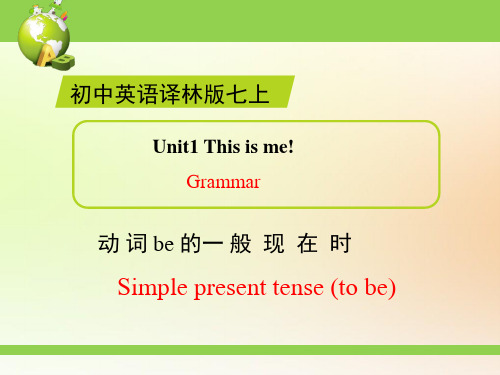
is not=__i_sn_’_t_ are not=_a_r_e_n_’t
• He isn’t helpful or polite. • I’m not very tall or slim. • The students aren’t very happy.
• Sandy isn’t from China. • We aren’t in Class One, Grade Seven. • The girls aren’t behind the trees.
Maths __i_s______ an interesting lesson. 8.What ____is______the weather like today?
肯定句:
• I am an English teacher. • I am Millie. • It is a big school. • Mr. and Mrs. Fang are doctors.
Yes, they are./No, they aren’t.
• Is Sandy from China? Yes, she is./No, she isn’t. • Are you in Class One, Grade Seven? No, we aren’t. • Are the girls behind the trees? No, they aren’t.
be 后+介词短语
把下列句子改为否定句:
• I am an English teacher. • I am Millie. • It is a big school. • Mr. and Mrs. Fang are doctors.
• He is helpful and polite. • I’m very tall and slim. • The students are very happy.
- 1、下载文档前请自行甄别文档内容的完整性,平台不提供额外的编辑、内容补充、找答案等附加服务。
- 2、"仅部分预览"的文档,不可在线预览部分如存在完整性等问题,可反馈申请退款(可完整预览的文档不适用该条件!)。
- 3、如文档侵犯您的权益,请联系客服反馈,我们会尽快为您处理(人工客服工作时间:9:00-18:30)。
系表结构表示主语所处的状态 ,
被动语态则表示主语所承受的动作.
Great Scientists
Page 4 Ex.3
1). He got blamed about losing the money. (blame) 2). The painter looked so tired after working for a whole day. (tire) 3). I was disappointed with the film I saw last night. I had expected it to be better. (disappoint) 4). Everybody was shocked to hear of the death of the famous film star. (shock) 5). Everybody is really excited about the new Olympic stadiums. (excite) 6). His wound became infected with a new virus. (infect)
听了他的发言,在场的所有人都很振奋。
You seem frightened. 你看上去很害怕。 The window is broken. 窗户坏了。
Stop1
系表结构和被动结构
• This lake is badly polluted . (系表结构) • This lake is badly polluted by a paper mill . ( 被动结构)
The Past Participle used as Predicative
She looked worried.
I am interested in the book.
He was lost in thought. The door remained locked.
过去分词作表语,放于系动词之后,表示 主语的特点或所处的状态。
Great Scientists
Past Participle as the Aredicative and Attribute
过去分词作表语和定语
Great Scientists
1 构成: v +ed 或不规则的变化动词 Page 104-106 2 过去分词本身的含义: 被动或完成 a broken heart a lost dog a risen sun an escaped prisoner a retired general faded colors
Gas Station
Great Scientists
Review 定语 or Predicative表语? Attribute • 1). Many thousands of terrified people died every Attribute time there was an outbreak of cholera. • 2). John Snow became inspired when he thought Predicative about helping ordinary people exposed to it. • 3). He found that virus came from the river polluted byAttribute the dirty water from London.
Attribute
• 4). From the stomach the disease quickly attacked the body and soon the person Attributedied.
• 5). He immediately told the astonished people in Broad Street to remove the handle. Attribute
Great Scientists
过去分词做定语,修饰名词或代词 2).过去分词短语作定语时,通常放在被修饰的名词之后, 表被动或完
成意义,它的作用相当于一个定语从句。如:
The books written by Lu Xun are popular. = The books which were written by Lu Xun are popular. 鲁迅写的书很受欢迎 We’ll go to visit the bridge built hundreds of years ago. = We’ll go to visit the bridge that was built hundreds of years ago. 我们要去看那座建于几百年前的桥。 注意:过去分词短语有时亦可用作非限制性定语,前后常有逗号。 Some of them, brought up in villages, had never seen a train.
be动词和系动词
1、be 动词 2、表示变化的动词:become, get, turn, go, grow等 3、感官动词:look, feel, smell, taste, sound等 4、还有seem, appear, stay, keep, remain, turn out等
Great Scientists
Great Scientists
The Past Participle used as Attribute
过去分词做定语,修饰名词或代词
1).单个的过去分词作定语,通常放在被修饰的名词之前,
表示被动或完成意义。
Stop2
a used stamp 一枚用过的邮票 an injured finger 一个受伤的手指 英语口语 spoken English 书面练习 written exercises T or F 发达国家 a developed country e.g. Needed everything Everything need is bought. 注意: 过去分词修饰 something, everything, anything, nothing, somebody, nobody等不定代词或指示代词 those时,要放在这些词的后面。 e .g. He is one of those invited.
The Past Participle used as Predicative
许多动词的过去分词已经被当作形容词使用,如:
disappointed, excited, moved, puzzled, pleased, surprised, lost等。 e.g.:Everyone present is very inspired at his speech.
